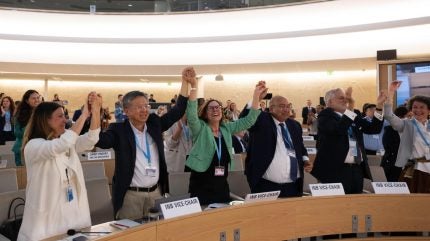
After years of debates between governments, member states of the World Health Organization (WHO) have formally adopted the world’s first Pandemic Agreement.
Also informally known as the Pandemic Treaty and Pandemic Accords, the agreement was made official on 20 May at the 78th World Health Assembly in Geneva, Switzerland, being held this week.

Discover B2B Marketing That Performs
Combine business intelligence and editorial excellence to reach engaged professionals across 36 leading media platforms.
Although the framework of the treaty was agreed in mid-April, countries still had to formally approve its adoption. That vote happened yesterday (19 May), with 124 member state delegations voting in favour of the agreement, with 11 abstaining. There were no objections.
“The world is safer today thanks to the leadership, collaboration and commitment of our member states to adopt the historic WHO Pandemic Agreement,” said WHO Director-General Dr Tedros Adhanom Ghebreyesus.
The Pandemic Agreement is an international joint initiative to fight the next pathogens that threaten global health. It includes a variety of measures to shore up the world’s infectious disease defences via health initiatives and instilling a ‘One Health’ approach.
Proposals include establishing a pathogen access and benefit sharing system, building geographically diverse research and development capacities, and creating a global health emergency workforce, among others. Many of its features are a result of lessons learned from the Covid-19 pandemic, ensuring that future pandemics will be countered with a robust global health framework.

US Tariffs are shifting - will you react or anticipate?
Don’t let policy changes catch you off guard. Stay proactive with real-time data and expert analysis.
By GlobalDataGhebreyesus added: “Now that the agreement has been brought to life, we must all act with the same urgency to implement its critical elements, including systems to ensure equitable access to life-saving pandemic-related health products.”
One of the key strategies is a coordinated financial mechanism to tackle pandemics in the future. Financing is something the WHO is having to grapple with as the US, the organisation’s largest supporter in terms of funding, is set to withdraw from its ranks in 2026. It is unclear from where the lost funding will be recuperated, though China is set to become the largest contributor to the organisation. The 78th World Health Assembly was the first one the US did not send delegates to, meaning the country was absent from the meeting.
During his opening statement at the assembly, Ghebreyesus defended the need for a $2.1bn annual budget, saying that people in at least 70 countries are missing out on medical treatment due to funding cuts.
Private companies ‘still critical’
A wider criticism shared by other countries relating to the pandemic agreement is the potential for power rerouting and illegitimate legislative capacity. In announcing the agreement’s adoption, the WHO said that “nothing in the WHO Pandemic Agreement shall be interpreted as providing the Secretariat of the WHO, including the Director-General [of WHO], any authority to direct, order, alter or otherwise prescribe the national and/or domestic law, as appropriate, or policies of any party, or to mandate or otherwise impose any requirements that parties take specific actions”.
Such actions include accepting or banning travellers, imposing vaccination mandates, or implementing lockdowns.
There are other concerns over the new agreement. The International Federation of Pharmaceutical Manufacturers and Associations (IFPMA) has questioned whether the treaty is feasible amid the uncertain funding landscape, along with worries around intellectual property (IP) protection for private companies.
In a statement made yesterday, the IFPMA said: “Given the current political and financial context, we question the feasibility of the WHO dedicating significant resources to new initiatives that go beyond its core mandate on norms and standards. We encourage the WHO to further prioritise areas where it has unique added value within its mandate and can best deliver on its mission.
“The pandemic agreement is a starting point, not an end in itself. Private companies will remain critical by driving the innovation necessary to develop and deliver the medicines and vaccines we will need when the next pandemic hits.”


